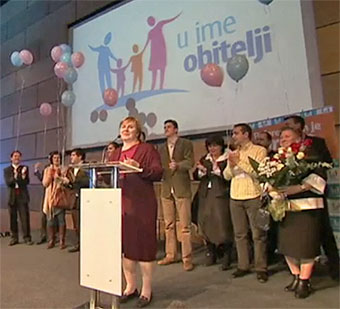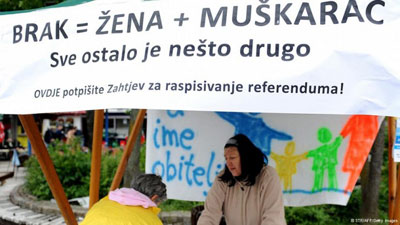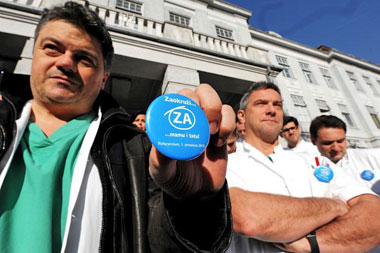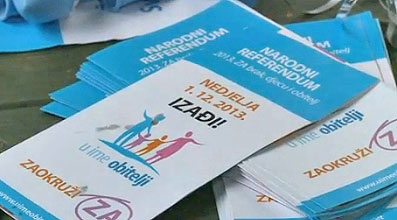Croatia votes to ban 'gay marriage' despite intimidation tactics
by Mass Resistance
Croatia votes overwhelmingly to ban 'gay marriage.' Voters ignore pressure from government, media, activists (and even US State Dept).
On Sunday, Dec. 1, the people of Croatia overwhelmingly voted to ban "gay marriage" in that country. A constitutional amendment was passed by 66%-34%. This was despite enormous pressure from the Croation government, the press, homosexual activists, and even the US State Department to reject it.
| Traditional marriage supporters celebrate in front of packed auditorium as vote results are officially announced in Croatia. |
|
The force of the church and the people
This was accomplished entirely by the church and the citizens of Croatia. Earlier this year the government drafted a bill that would allow same-sex couples to register as "life partners." People correctly saw this as the first step toward legalizing same-sex "marriage" -- as happened recently in Hawaii and earlier in California and many other places.
Approximately 90% of the Croatians are Catholic. The Catholic Church stepped up and organized for a referendum to amend the Constitution to ban "gay marriage" entirely. Other religious groups also got involved. Over 15 days they gathered nearly a quarter million signatures to put it on the ballot. It was an outstanding effort!
| In just 15 days people across the country collected nearly a quarter million signatures for the petition. Booths like this one were set up. (AFP photo.) |
|
Threats and harassment
Government leaders, the press, with the homosexual movement went right to work to try to stop it. They began a campaign of intimidation, including vicious labeling of pro-marriage supporters as "haters, fascists, Nazis, bigots", etc. They portrayed Christian believers in marriage as uneducated and primitive. Public supporters of the amendment were harassed by the government in various ways. It was reminiscent of the old days under Communism, many said.
Homosexual activists -- guarded by riot police -- paraded in cities and at the Parliament with signs excoriating supporters of the measure.
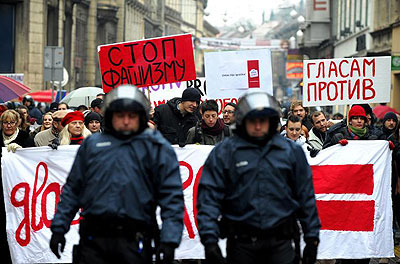 |
With police escorts crowds of homosexual activists marched in the streets to intimidate people from voting for the amendment. |
The U.S. government even got involved. In On Oct. 24 a US State Department official came to Croatia and gave a chilling speech about how committed the US is to promoting the LGBT movement. He went on to describe how the State Department helps fund LGBT activism in other countries around the world where it's needed, and is "engaging international organizations" to support LGBT rights. (To Americans, that is extemely offensive and insulting. Unfortunately, the Obama Administration gets away with that because the GOP and the conservative movement are afraid to complain about it.)
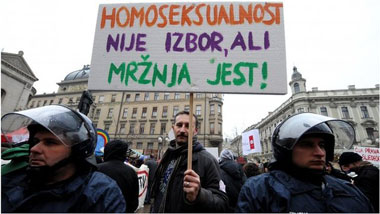 |
"Gay" message to pro-family voters. This sign says, "Homosexuality is not a choice, hate is a choice." |
People ignore pressure and vote
But in the end, the people weren't stopped. Despite the huge pressure not to vote, or to vote against it, the people came to the polls and sent a strong message to their politicians, the press, the homosexual movement -- and the world.
| No fear. A doctor from the main maternity hospital in Zagreb,Croatia defiantly holds up a "yes" button two days before the vote. (AFP photo) |
|
Weak, biased coverage in mainstream media
Not surprisingly, unlike recent legislative votes in Hawaii and Illinois where the politicians voted to impose "gay marriage" on the people, this pro-family victory was not widely covered -- or celebrated --by the press in the US.
And most of the European press coverage, such as BBC and EuroNews was very biased and slanted toward the "gay" point of view.
But this report from C-Fam (Catholic Family and Human Rights Institute) tells what really happened:
Croatia Upholds Marriage, Despite Government Threats
By Wendy Wright, C-FAM
NEW YORK, December 6, 2013
[See web version here]
Croatians cast their ballots last Sunday and the result was swift and clear: 66% voted to add marriage is a "union between a man and a woman" in Croatia's constitution.
Government officials were unhappy, and called the marriage referendum divisive, discriminatory, and a waste of money. Reports of officials intimidating supporters leaked in the weeks before the vote. Yet supporters -- many who grew up under communist rule -- did not buckle under threats of investigations and being labeled fascists.
The conflict began in May after Croatia's government drafted a law for same-sex couples to register as "life partners." The country already recognizes unregistered cohabitation for same-sex couples, including next-of-kin and inheritance rights, but excludes the right to adopt children.
A group quickly formed, called "In the Name of the Family." They gathered over 740,000 signatures in 15 days for a nationwide referendum asking: Do you support amending the constitution to define marriage as a life-long union of a woman and a man? Homosexual groups said the wording was biased.
It was Croatia's first citizen referendum since its independence in 1991.
"We believe that marriage, children and family are such important issues that the whole society has to decide them," Zeljka Markic, the leader of the initiative, told AFP. People of different faiths -- Orthodox, Protestants, Muslims and Jews -- supported it.
In a letter read in Catholic churches across the country, Cardinal Josip Bozanic said, "Marriage is the only union enabling procreation." Almost 90% of the population is Catholic.
But supporters feared retaliation.
A popular priest and student chaplain at Zagreb University was pressured to be silent on marriage. Rev. Damir Stoji?, who speaks on chastity and runs a pray-rather-than-pay café, was summoned by an official for organizing a panel on the referendum, a tactic reminiscent of communist oppression.
Gong, a homosexual group funded by the European Commission, pressured the pro-marriage group to release donors' names. Markic -- who endured a government investigation of her business and personal property -- declined, explaining volunteers were already "exposed to public lynching."
A commenter on a news website elaborated. In Croatia, 95% of pro-marriage voters didn't speak openly because they were "tagged by mainstream media and TV as fascist, Nazis, uneducated, primitive, as Catholic talibans -- this is a new term made up by this horrible campaign."
"In this month I realized what is like to live in dictatorship, to fear to express your opinion so my business and social status" are not damaged.
Recently, Croatia's foreign minister joined the LGBT Core Group at the UN that committed to "concerted action" on homosexual and transgender rights.
Last month, a U.S. official spoke in Croatia at the International Lesbian, Gay, Bisexual, Trans and Intersex Association (ILGA) Europe's annual conference. She said a top priority for President Obama is "engaging international organizations to fight LGBT discrimination" and criticized expressions of opposing views of gay pride marches.
After voting against the marriage referendum, Croatia's president Ivo Josipovic pledged to push a bill granting more privileges to homosexual persons living together.
Elsewhere, Markic told a cheering crowd, "We showed that we know, like David fighting Goliath, how to direct our small sling stones in the same direction. This time for the protection of marriage, next time for something else of the same importance."
Croatia is the newest member of the European Union, and the sixth to protect marriage in its constitution, joining Poland, Bulgaria, Latvia, Lithuania and Hungary.
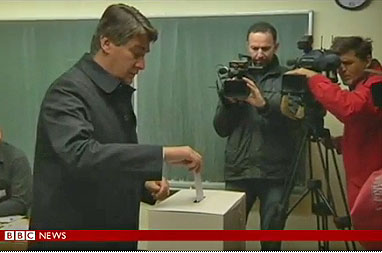 |
Press coverage. Croatia's president angrily votes against the amendment at polling place as eager TV crews capture the scene. |
Observations on the Croatia victory
Why has the "gay marriage" freight train been stopped in so many Eastern European countries -- Croatia, Serbia, Montenegro, Poland, Bulgaria, Latvia, Lithuania, Hungry? We think there are some interesting observations from watching the Croatia situation:
1. Memories of Communism. It's been only about 25 years since the fall of Communism in Eastern Europe. People still have that experience in them. They're used to their political leaders, the nation's press, and their government being disconnected from the people and supporting destructive programs. They're used to being threatened if they get out of line, and seeing people demeaned and demonized by those in power.
And they watched as the Communist regime all came crashing down, much of that as a result of people finally standing up to it. So standing up to political pressure and intimidation is something they viscerally understand.
2. Strong Church influence. Since Communism fell, the Roman Catholic Church, as well as Orthodox and other churches have become a strong part of society. Thus, the government's attempts to impose atheistic changes to society are more difficult
3. No "conservative" movement like the West. Unlike the United States and Britain, Eastern Europe's pro-family energy is not dominated by a lumbering "conservative movement" that gets distressed when demonized and seeks respect, harmony, moderation, and eventual compromise when faced with confrontation from the Left. Over the last 60 years the modern conservative movement has evolved in the West, and there is no Eastern European equivalent to that. As a result, the pro-family movement has the ideological freedom and energy to take on bold challenges without needless emotional and intellectual baggage holding it back.
It's something we in America must learn from as we move forward.
| Pro-marriage literature about the Dec. 1 vote was given out far and wide! |
|

